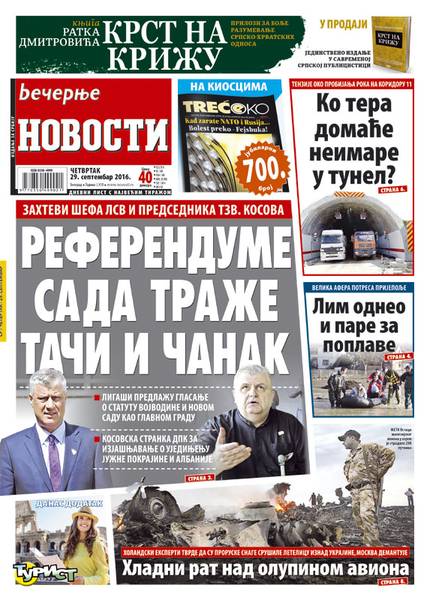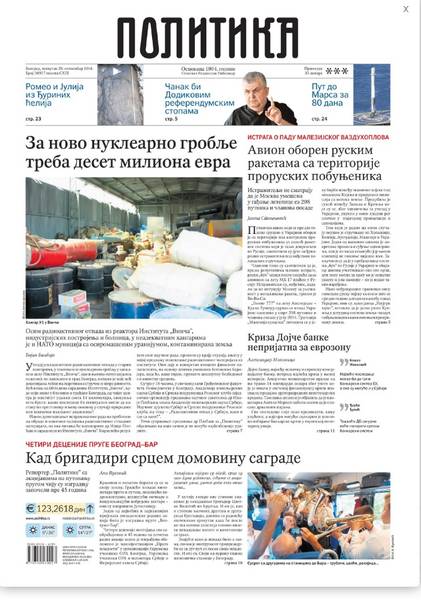Croatian-Serbian Relations Cannot Stand Even a Movie
Adelina Marini, September 29, 2016
The big movie-event of the year in the region is the Croatian film “The Constitution” (original title “Ustav Republike Hrvatske”), the screenplay of which is written by the well-known Croatian writer Ante Tomić and Rajko Grlić. The movie is advertised as “A love story about hatred”. Of course, it deals with the Serbian-Croatian relations, told in the typical for the region comedy movie style. The plot is based on a true story. It reveals Croatian intolerance, prejudice, and hatred for the different, according to the movie’s promo. Before even being shown in the region, the movie has already won the Grand Prix of the Americas for best film at the Montreal World Film Festival. The film’s premiere will be a regional one – Zagreb, Ljubljana, and Belgrade – in the beginning of October, but is already causing problems between neighbours.
According to the Croatian Vecernji list, Belgrade does not dare show the film. A month before the premiere in Serbia and Montenegro, Serbian distributor Blitz has refused the distribution for this region. The explanation is of a non-commercial character, reports the newspaper. “If the poster is provocative, so should it be, for otherwise it means we have failed the campaign”, says producer Ivan Maloča. Director Rajko Grlić refuses to comment on the situation, but is surprised, because the distribution contract was signed before the summer, so most probably the problem is in the poster, which only says “The Constitution of the Republic of Croatia in Serbia from October 20".
Grlić announced, however, that thanks to the international acclaim and the quality of the movie a new distributor has been found in the last minute. “Regarding the poster, its goal is attracting attention and of course it will become evident very quickly that it is about the movie of Rajko Grlić”, reports Vecernji. The movie’s trailer with English subtitles can be seen in the attached video file.
Dodik is a winner, Vučić is angry
Day four after the illegal referendum in Bosnia and Herzegovina. The subject continues to grasp the attention of media in the region. In a commentary for the Croatian Novi list, Tihomir Ponoš writes that Milorad Dodik is the winner in this referendum. “The main reason for his victory is not his strength, but rather the weakness of others. Dodik simply used the fact that nobody is interested in Bosnia and Herzegovina or, at least, it is not high on the priorities’ list and while it is so Dodik will continue to be able to play around and run referenda in the future, as he already announced”, writes the author. “He is fully aware that in his fief no one could do anything to him, not because one cannot do it, but because they do not wish to at the moment”, continues Tihomir Ponoš.
Serbian Blic in turn reports that Prime Minister Aleksandar Vučić is mad at Dodik because of his stubbornness and his resistance to the influential international community. The newspaper talked to analysts, who believe that in the name of strategic goals, regional stability, but also his own rating, Vučić will swallow his rage against Dodik. Vučić did not hide his current position on the issue in an interview for the Italian La Repubblica: "Take a look at the referendum-ish Bosnia – Bosnian Serbs claim to be for the EU, but talk about Bosniaks in the worst possible manner”, said the Serbian PM for the Italian daily. Emotions between Dodik and Vučić could rather be described as political disappointment than anger or wounded vanity, thinks Bojan Klačar of Cesid.
Dragomir Anđelković, too, does not expect a large confrontation. “I believe Vučić is a rational politician and I doubt he will confront Dodik. If he does so, he would deal himself political damage, for a large portion of his constituents are nationally oriented and hold Dodik in good regard. On the other hand, Dodik too has no reason to confront Serbia”, says Anđelković for Blic. “If the Prime Minister is truly angry, it is because Dodik took away from him the control, which Vučić often demonstrated publicly, building special relations with leaders in Republika Srpska”, is the opinion of the director of the Centre for Regionalism Aleksandar Popov.
 Vecernje novosti reports on page one that there are already two new requests for referenda in the region. "They had not even counted the votes yet in the Republika Srpska, when in the very same day Nenad Čanak and Hashim Thaçi spilled oil on the burning Balkan hotplate”, writes the newspaper clarifying that the leader of the League of Social Democrats of Vojvodina Nenad Čanak got mad at the statement of Serbian President Tomislav Nikolić that the referendum in RS demonstrated the will of the population and should not be left just on paper. “If the legal ruling of the highest judicial institutions of a sovereign state could be overthrown with referenda, organised in a part of the state’s territory, then we propose that a referendum is held in Vojvodina”, said Čanak.
Vecernje novosti reports on page one that there are already two new requests for referenda in the region. "They had not even counted the votes yet in the Republika Srpska, when in the very same day Nenad Čanak and Hashim Thaçi spilled oil on the burning Balkan hotplate”, writes the newspaper clarifying that the leader of the League of Social Democrats of Vojvodina Nenad Čanak got mad at the statement of Serbian President Tomislav Nikolić that the referendum in RS demonstrated the will of the population and should not be left just on paper. “If the legal ruling of the highest judicial institutions of a sovereign state could be overthrown with referenda, organised in a part of the state’s territory, then we propose that a referendum is held in Vojvodina”, said Čanak.
A possible question would be “Do the citizens accept the shameful ruling of the Constitutional Court of Serbia from two years ago for the removal of Vojvodina’s statute, thus disallowing Novi sad to be our capital?”, quotes him Vecernje novosti. And in Kosovo the MP from Hashim Thaçi’s Democratic Party of Kosovo Nait Hasani stated that the constitutional right to adopt a law should be used and a referendum should be organised on unification with Albania.
Sarajevo’s Dnevni avaz runs on page one the ten sins of Prosecutor General Goran Salihović, who was suspended on Wednesday in a procedure for violations. The procedure was initiated after Salihović called the President of Republika Srpska Milorad Dodik to a hearing regarding the referendum in the Serbian part of BiH. According to Avaz, Salihović’s sins are: leaking evidence on important cases; ostentatious arrests with no evidence, groundless prosecution of MPs; deliberately providing false or manipulated information; unmeasured contacts and interference in the work of judges and prosecutors; granting immunity and protection to criminals; obstructing the implementation of reforms for years; starting a war with the OSCE to cover his tracks; buying a property for 200 000 KM and spending money from IPA funds; prosecution of army veterans from Srebrenica; continuous pressure on media.
Đukanović misunderstood the EU about media
Milo Đukanović, who presents himself as the only Euro-Atlantic leader in Montenegro, seems to have not understood well the EU recommendations about media, as it becomes clear from the latest scandal in the country. Montenegrin Vijesti reports that Đukanović’s party DPS calls for a punishment for the anchor from the Montenegrin public television Vukoman Leković for allowing during a pre-election debate for one of the participants to hand a pair of handcuffs to the DPS representative with the message that they are to be given to Milo Đukanović. The handcuffs were handed by the MP candidate of the opposition Democratic Front Marko Milačić, despite repeated demands by the anchor to get back to his seat. Following the incident the Montenegrin RTCG television sent  apologies to Marta Šćepanović of the DPS for the inconvenience caused, but states it holds no responsibility for what happened.
apologies to Marta Šćepanović of the DPS for the inconvenience caused, but states it holds no responsibility for what happened.
Vijesti reports, however, that an apology is not enough to the DPS, they demand sanctions. “Instead of an apology from the Council of the RTCG, as well as the director general of the public service, I expect that specific steps are taken, so that within their powers they sanction those who allowed this drastic violation of media rules for parliamentary elections”, stated Šćepanović. She claims that the television is practically an accessory to Leković in the “unprecedented humiliation” of RTCG.
Could the Deutsche Bank crisis endanger European finances?
This is the headline on page one of today’s edition of the Serbian Politika. The newspaper reports on the financial problems of the largest German bank and writes that it is difficult to forecast all the consequences, but the worst-case scenario is a second eruption of the bank crisis in the euro area. “We are talking about the largest European commercial bank, which is of systemic importance, for changes in such banks have influence on the entire global banking system and the greatest consequences could be for the banking sector in the EU”, Boško Živković, professor in the Belgrade Economic Institute, told Politika.
Translated by Stanimir Stoev
 Bakir Izetbegovic, Andrej Plenkovic | © Council of the EU
Bakir Izetbegovic, Andrej Plenkovic | © Council of the EU Aleksandar Vucic, Recep Tayyip Erdogan | © Serbian Presidency
Aleksandar Vucic, Recep Tayyip Erdogan | © Serbian Presidency Jean-Claude Juncker, Zoran Zaev | © European Commission
Jean-Claude Juncker, Zoran Zaev | © European Commission